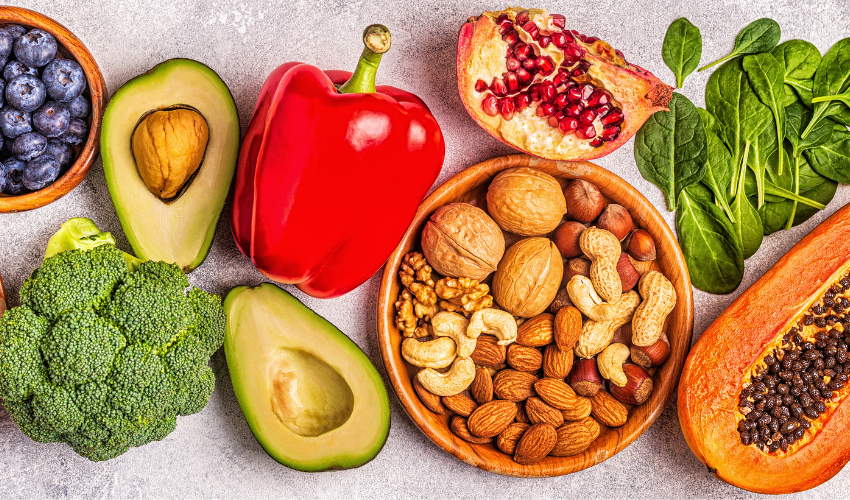Inflammation is a natural immune response that helps the body fight infections and heal injuries. However, chronic inflammation can lead to various health problems such as heart disease, diabetes, and cancer. The good news is that you can reduce inflammation by incorporating anti-inflammatory foods into your diet. These foods contain antioxidants, vitamins, and minerals that can help neutralize free radicals and reduce inflammation. In this article, we will explore the top anti-inflammatory foods that you should include in your diet for optimal health.
Top Anti-Inflammatory Foods:
- Fatty fish
Fatty fish such as salmon, mackerel, and sardines are rich in omega-3 fatty acids, which have potent anti-inflammatory effects. Omega-3 fatty acids can reduce the production of inflammatory molecules in the body and help prevent chronic inflammation. Try to eat at least two servings of fatty fish per week to reap their benefits.
- Berries
Berries such as strawberries, blueberries, and raspberries are packed with antioxidants and polyphenols, which can help reduce inflammation. These compounds can also protect the body from oxidative stress and improve cognitive function. Try to add a handful of berries to your breakfast or snack for a nutritious and anti-inflammatory boost.
- Leafy greens
Leafy greens such as kale, spinach, and collard greens are rich in vitamins and minerals that can help reduce inflammation. These vegetables are also high in fiber, which can promote gut health and improve digestion. Try to include leafy greens in your salads, smoothies, or stir-fries for a nutritious and delicious meal.
- Turmeric
Turmeric is a spice that has been used for centuries in traditional medicine for its anti-inflammatory properties. The active compound in turmeric, curcumin, can help reduce inflammation and oxidative stress in the body. Try to add turmeric to your soups, curries, or smoothies for a flavorful and anti-inflammatory boost.
- Nuts
Nuts such as almonds, walnuts, and pistachios are rich in healthy fats, fiber, and antioxidants, which can help reduce inflammation. These foods can also lower the risk of heart disease and improve brain function. Try to snack on a handful of nuts or add them to your salads for a healthy and anti-inflammatory boost.

FAQs:
Can anti-inflammatory foods replace medications for chronic inflammation?
Anti-inflammatory foods can help reduce inflammation, but they cannot replace medications for chronic inflammation. If you have a chronic inflammatory condition, it is important to work with your healthcare provider to develop a treatment plan that includes both medications and dietary changes.
Are there any side effects of consuming anti-inflammatory foods?
Anti-inflammatory foods are generally safe for consumption and do not have any significant side effects. However, some people may experience allergic reactions to certain foods or supplements. It is important to consult with your healthcare provider before making any significant dietary changes.
How long does it take to see the benefits of anti-inflammatory foods?
The benefits of anti-inflammatory foods may vary depending on the individual and their dietary habits. Some people may notice the benefits within a few weeks, while others may take longer to see significant improvements.
Can anti-inflammatory foods help with weight loss?
Anti-inflammatory foods can help with weight loss by reducing inflammation and promoting satiety. These foods are typically low in calories and high in fiber, which can help you feel full and satisfied after meals.
Are there any foods that can increase inflammation?
Yes, there are certain foods that can increase inflammation in the body. These include:
- Processed foods: Foods that are high in sugar, unhealthy fats, and additives can trigger inflammation in the body.
- Refined carbohydrates: Refined carbohydrates such as white bread, pasta, and rice can cause a spike in blood sugar levels, leading to inflammation.
- Fried foods: Fried foods are high in unhealthy fats and can cause inflammation in the body.
- Red meat: Red meat is high in saturated fats and can increase inflammation in the body.

Conclusion
Incorporating anti-inflammatory foods into your diet can help reduce inflammation and improve your overall health. These foods are rich in antioxidants, vitamins, and minerals that can help neutralize free radicals and promote healing in the body. By adding fatty fish, berries, leafy greens, turmeric, and nuts to your meals, you can enjoy delicious and nutritious foods while reaping their anti-inflammatory benefits. Remember to also limit or avoid processed foods, refined carbohydrates, fried foods, and red meat to reduce inflammation in the body. Make anti-inflammatory foods a part of your daily diet and enjoy a healthier, happier life.






















